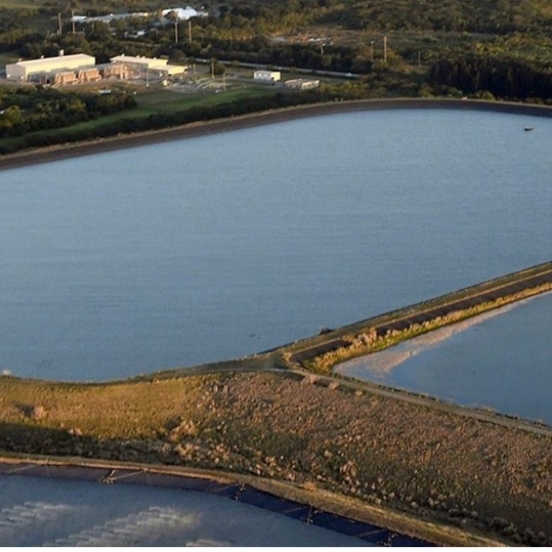Climate, Health and Equity Brief
Toxic waste, flood risks and environmental fallout
April 10, 2021

The Climate, Health & Equity Brief is GMMB’s take on the week’s news on the current impacts of climate change. If you haven’t subscribed yet, you can do so by clicking here.
Hot Topic: Toxic mess. When a massive industrial wastewater reservoir threatened to collapse in Manatee County, Florida after a tear appeared in its lining last weekend, hundreds of families were forced to evacuate their homes and told to brace themselves for a catastrophic and toxic flood. The reservoir—owned by private industrial corporations since 1970 and abandoned when the nearby Piney Point plant closed in 2001—holds 480 million gallons of water laced with phosphorus, nitrogen, ammonia and other toxic byproducts.
The pit had been leaking two to three million gallons of the contaminated water per day since March 26, and a full-blown collapse of the entire reservoir was looking unavoidable. Miraculously, workers were able to avert such a breach, which would have inundated miles of homes and businesses with toxic sludge—by diverting 170 million gallons of the slurry into Tampa Bay. And because crews are still working to repair the initial lining tear, a steady stream of toxic water continues to flow into Bishop Harbor, a nearby aquatic preserve. This invasion of Florida’s waterways threatens to spark widespread and harmful algae blooms that could deplete oxygen in the water, cause mass die-offs of fish and other sea life, and pose a credible threat to industries that sustain Florida’s economy, including fishing, boating and tourism.
Unfortunately, this imminent threat is not unique. There are an estimated 670,000 wastewater pits across the U.S., and a 2019 report found that at least 60 percent of them are vulnerable to collapse, particularly as climate change fuels increasingly frequent and deadly storms. And with communities of color 75 percent more likely than whites to live in neighborhoods impacted by industrial activity, cleaning up these sites is a matter of environmental justice.
Last week, President Biden announced a $20 billion plan to remove highways that run through low-income communities and communities of color, which will help reduce inequitable exposure to toxic emissions. While the administration has not yet announced a commitment to cleaning up wastewater reservoirs, incoming EPA Administrator Michael Regan led North Carolina’s effort to hold Duke Energy accountable when one of their coal ash pits breached in 2014. With his background in demanding greater corporate accountability and recent directive to prioritize environmental justice within the EPA, Regan is well-suited to spearhead a national push to find a permanent solution to the threats posed by these toxic wastewater pits.
— Matt & Traci, GMMB
Health
While the collapse of an industrial waste pit in Manatee County, Florida was narrowly avoided this week, scientists warn that increasingly severe climate-induced weather events threaten to inundate thousands of similar toxic wastewater pits—and the communities that surround them—across the U.S. (The New York Times)
In a first-of-its-kind study, direct satellite observations from NASA have provided irrefutable proof that greenhouse gases and atmospheric pollution particles from the burning of fossil fuels are responsible for driving planetary warming. (CBS News)
California officials announced that the accumulation of snow in the Sierra Nevada mountains is currently 40 percent below the average for this time of year, leaving the state vulnerable to severe water shortages, worsening drought conditions and another devastating wildfire season. (The Guardian, Axios)
Flash floods and torrential landslides triggered by Tropical Cyclone Seroja in Indonesia and East Timor this week have killed at least 167 people, displaced 10,000 more and destroyed thousands of homes, bridges and other critical infrastructure. (Aljazeera)
After Japan recorded its earliest cherry blossom season in 1,200 years, scientists warn that the early blooms are an indication of widespread temperature shifts that could negatively impact global crop yields and food supply. (CNN)
Equity
As part of President Biden’s infrastructure plan announced last week, $20 billion is earmarked to remove highways that cut through low-income communities and communities of color, disproportionately exposing them to fine particulate matter from auto emissions. (The Washington Post)
In a policy change aimed at improving equity, FEMA announced that it would begin taking home value into account when calculating flood insurance premiums to ensure that people with lower-value homes do not pay more than their share of risk compared to people with higher-value homes. (The Hill)
Climate change is more than parts per million and greenhouse gases. The people who are feeling the worst impacts of climate change, their voices have got to be heard.
-Dr. Robert Bullard, father of environmental justice
Politics & Economy
A new study revealed that human-induced planetary heating has reduced global agricultural output by about 21 percent since the 1960s despite significant advances in farming technology and world population growth of nearly five billion. (The Guardian)
The Biden administration announced a number of proposed changes to the corporate tax code this week to pay for the American Jobs Plan, including the replacement of fossil fuel subsidies with clean energy tax incentives to promote clean energy production. (The New York Times)
A recent Gallup poll found that two out of three Republicans deny that climate change is driven by human activity—with just 32 percent of Republicans overall acknowledging humanity’s role in the crisis, compared to 88 percent of Democrats. (E&E News)
A new analysis revealed that despite cutting nearly 60,000 jobs last year, 77 fossil fuel companies claimed $8.2 billion in benefits after taking advantage of federal tax cuts under the CARES Act. (InsideClimate News)
Action
The NOAA has updated its global computer forecasting model to increase the accuracy of location and intensity predictions for hurricanes, snowstorms and rainstorms up to two weeks into the future. (NPR)
Long Reads
In our recent survey, many of you requested recommended long reads as part of the Brief. We are pleased to add this section starting this week based on your feedback.
Nearly 40 years since a North Carolina protest against the dumping of toxic chemicals in a Black farming community helped to coin the term “environmental racism,” activists across the U.S. continue to fight against the disproportionate exposure of communities of color to industrial pollution. (The Washington Post)
Kicker
Need some feel-good content this week? Have a laugh with this stand-up comedy special focused on climate change and environmental justice.






